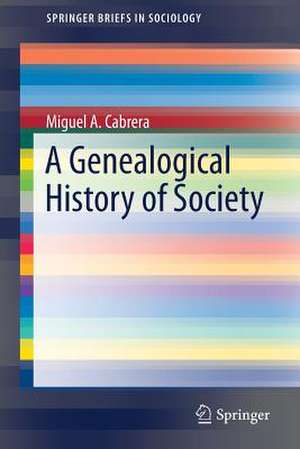A Genealogical History of Society: SpringerBriefs in Sociology
Autor Miguel A. Cabreraen Limba Engleză Paperback – 8 noi 2017
This book provides a detailed reconstruction of the process of formation of the modern concept of society as an objective entity from the 1820s onwards, thus helping to better understand the shaping of the modern world and the nature of the current crisis of modernity. The concept has exerted considerable influence over the last two centuries, during which time many people have conceived themselves and behave as members of a society, and social scientists have explained human subjectivities and conducts as social effects. For both groups, society exists as a very real phenomenon. Historical inquiry shows, however, that the modern concept of society is no more than a historically contingent way of imagining and making sense of the human world.
Din seria SpringerBriefs in Sociology
-
 Preț: 380.07 lei
Preț: 380.07 lei -
 Preț: 347.36 lei
Preț: 347.36 lei -
 Preț: 444.35 lei
Preț: 444.35 lei -
 Preț: 379.86 lei
Preț: 379.86 lei -
 Preț: 381.21 lei
Preț: 381.21 lei -
 Preț: 378.54 lei
Preț: 378.54 lei -
 Preț: 376.59 lei
Preț: 376.59 lei -
 Preț: 447.62 lei
Preț: 447.62 lei -
 Preț: 379.68 lei
Preț: 379.68 lei -
 Preț: 380.25 lei
Preț: 380.25 lei -
 Preț: 361.03 lei
Preț: 361.03 lei -
 Preț: 175.76 lei
Preț: 175.76 lei -
 Preț: 379.86 lei
Preț: 379.86 lei -
 Preț: 413.45 lei
Preț: 413.45 lei -
 Preț: 375.45 lei
Preț: 375.45 lei -
 Preț: 413.84 lei
Preț: 413.84 lei - 15%
 Preț: 463.68 lei
Preț: 463.68 lei -
 Preț: 376.59 lei
Preț: 376.59 lei -
 Preț: 444.74 lei
Preț: 444.74 lei -
 Preț: 174.44 lei
Preț: 174.44 lei -
 Preț: 375.84 lei
Preț: 375.84 lei -
 Preț: 379.68 lei
Preț: 379.68 lei -
 Preț: 260.18 lei
Preț: 260.18 lei -
 Preț: 376.59 lei
Preț: 376.59 lei -
 Preț: 380.63 lei
Preț: 380.63 lei -
 Preț: 261.15 lei
Preț: 261.15 lei -
 Preț: 263.67 lei
Preț: 263.67 lei -
 Preț: 346.86 lei
Preț: 346.86 lei -
 Preț: 342.03 lei
Preț: 342.03 lei -
 Preț: 260.38 lei
Preț: 260.38 lei -
 Preț: 343.39 lei
Preț: 343.39 lei -
 Preț: 378.34 lei
Preț: 378.34 lei -
 Preț: 378.34 lei
Preț: 378.34 lei -
 Preț: 410.94 lei
Preț: 410.94 lei -
 Preț: 376.59 lei
Preț: 376.59 lei
Preț: 377.73 lei
Nou
Puncte Express: 567
Preț estimativ în valută:
72.30€ • 74.51$ • 61.04£
72.30€ • 74.51$ • 61.04£
Carte tipărită la comandă
Livrare economică 01-15 martie
Preluare comenzi: 021 569.72.76
Specificații
ISBN-13: 9783319704364
ISBN-10: 3319704362
Pagini: 106
Ilustrații: V, 106 p.
Dimensiuni: 155 x 235 mm
Greutate: 0.17 kg
Ediția:1st ed. 2018
Editura: Springer International Publishing
Colecția Springer
Seria SpringerBriefs in Sociology
Locul publicării:Cham, Switzerland
ISBN-10: 3319704362
Pagini: 106
Ilustrații: V, 106 p.
Dimensiuni: 155 x 235 mm
Greutate: 0.17 kg
Ediția:1st ed. 2018
Editura: Springer International Publishing
Colecția Springer
Seria SpringerBriefs in Sociology
Locul publicării:Cham, Switzerland
Cuprins
Introduction.- Chapter 1. The Making of Society.- Chapter 2. Society as Economic Structure.- Chapter 3. A Genealogical Concept.- Epilogue: The Disenchantment of the Social.
Notă biografică
Miguel A. Cabrera (1960) is Professor of Modern History at the University of La Laguna, Tenerife, Spain. He has investigated on subjects such as the history of social citizenship and social reformism. He is also a specialist in historiographical studies, history of concepts, and the history of Modernity.
Textul de pe ultima copertă
This book provides a detailed reconstruction of the process of formation of the modern concept of society as an objective entity from the 1820s onwards, thus helping to better understand the shaping of the modern world and the nature of the current crisis of modernity. The concept has exerted considerable influence over the last two centuries, during which time many people have conceived themselves and behave as members of a society, and social scientists have explained human subjectivities and conducts as social effects. For both groups, society exists as a very real phenomenon. Historical inquiry shows, however, that the modern concept of society is no more than a historically contingent way of imagining and making sense of the human world.
Caracteristici
Discusses the genesis and the process of formation of the modern concept of society Helps us to better understand and assess the crisis of modernity perceived in recent times Provides theoretical and epistemological foundations of the modern social sciences Includes supplementary material: sn.pub/extras
